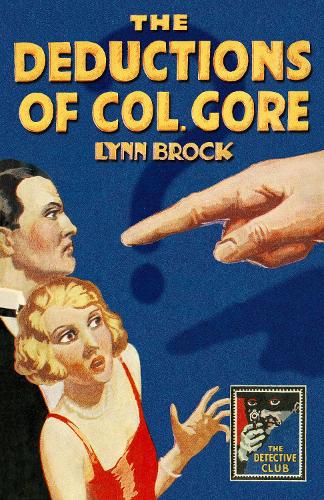
The Deductions of Colonel Gore (Detective Club Crime Classics)
(Hardback)
Publishing Details
The Deductions of Colonel Gore (Detective Club Crime Classics)
By (Author) Lynn Brock
Introduction by Rob Reef
HarperCollins Publishers
Collins Crime Club
14th December 2018
15th November 2018
United Kingdom
Classifications
General
Fiction
813.54
Physical Properties
Hardback
320
Width 126mm, Height 190mm, Spine 31mm
320g
Description
This brand new edition of the first novel to feature the officer and gentleman detective Colonel Wickham Gore includes the first ever reprint of the only Colonel Gore novella, Too Much Imagination.
Colonel Gore is reunited with old friends at a dinner party to mark his return from service in Africa, but is shocked to discover that one of them has fallen victim to a callous blackmailer. When the antagonist is found dead, Gore finds that civilian life can be as challenging as anything in the army, especially when one of your friends may have become a killer . . . but which one
Once famous in the West End and on Broadway for plays written as Anthony Wharton, Dublin-born Alexander McAllister had become a publican in Surrey when, as Lynn Brock, his writing career took off again with the creation of country detective Colonel Wickham Gore. Described by Rose Mcaulay as a very clever writer: a gift for drawing life-like people and a lively sense of dramatic incident, Brock became a pillar of the Golden Age with his Colonel Gore whodunits and pioneering psychological novels including the lurid Nightmare.
This Detective Club classic is introduced by Rob Reef, author of the John Stableford mysteries, and for the first time reprints the only Colonel Gore novella, Too Much Imagination, a country house murder story from a rare 1926 American pulp magazine.
Reviews
A very clever writer: agreeable literary style, a good descriptive touch, a gift for drawing life-like people, and a lively sense of dramatic incident Rose Macaulay
Lynn Brock has a fine sense of character, and the power to excite Frank Swinnerton
Author Bio
Lynn Brock was one of the most popular and prolific detective novelists of the 1920s and 30s, famous for creating the detective character Colonel Gore and the pioneering psychological crime novel Nightmare. He won praise from fans and critics including Dorothy L. Sayers and T. S. Eliot.
